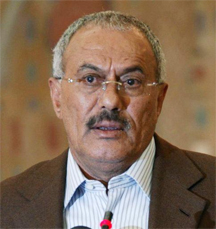SANAA, (Reuters) – Yemen’s opposition has agreed to take part in a transitional government under a Gulf-negotiated peace plan for veteran leader Ali Abdullah Saleh to step aside, an opposition source told Reuters yesterday.
Yemen’s Western and Gulf Arab allies have tried to mediate a solution to a three-month crisis in which protesters, inspired by revolts against autocratic rule in Egypt and Tunisia, have demonstrated relentlessly for the end of Saleh’s rule.
As opposition leaders met in Sanaa to discuss the plan, Yemeni forces killed three protesters at separate rallies outside the capital, witnesses said.

Under the Gulf proposal, Saleh can stay in power for a further 30 days before stepping down, and the opposition had earlier said it would stay out of a unity government.
But on Monday, the source said the opposition coalition, made up of Islamists and leftists, had changed it mind.
“After receiving clarifications from the Gulf side we agreed on the initiative and participating in a national unity government,” the source said. The plan has yet to be formally accepted.
An opposition refusal to take part could stymie the plan, and opposition sources have told Reuters the U.S. ambassador had pushed the group to come on board fully in a meeting on Sunday.
Seeing political allies desert him en masse, the Yemeni leader agreed in principle to a proposal by Gulf Cooperation Council foreign ministers to step down in exchange for immunity from prosecution for himself, his family and aides.
But analysts say that allowing Saleh to stay on for another month could leave room for further trouble in the poorest Arab state long on the brink of collapse.





